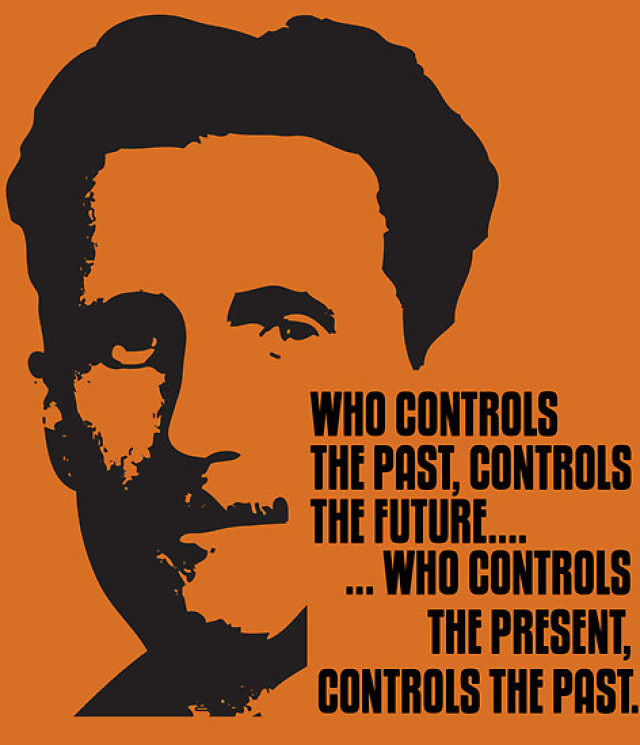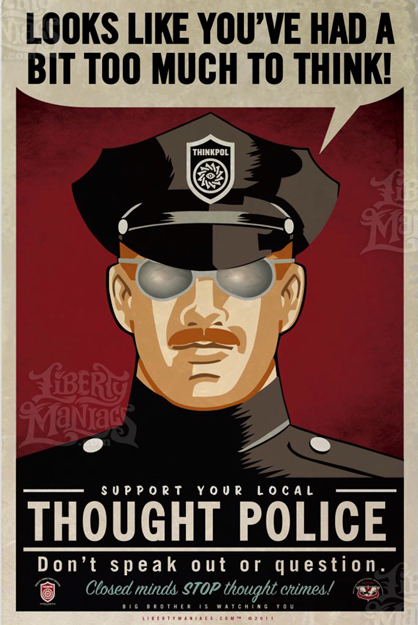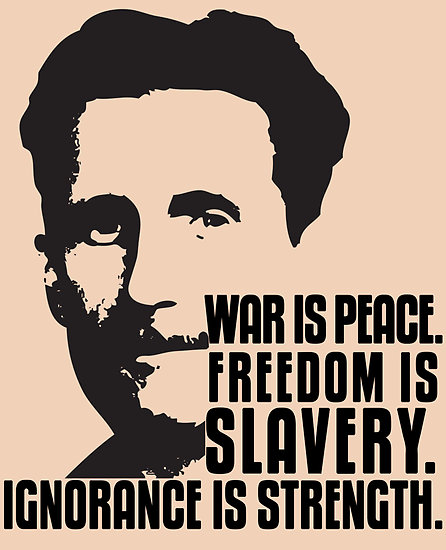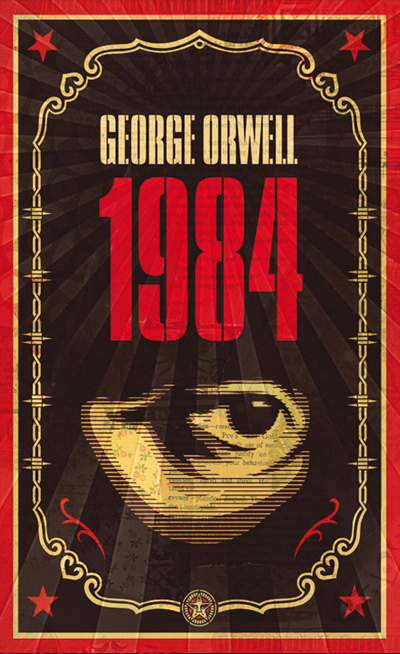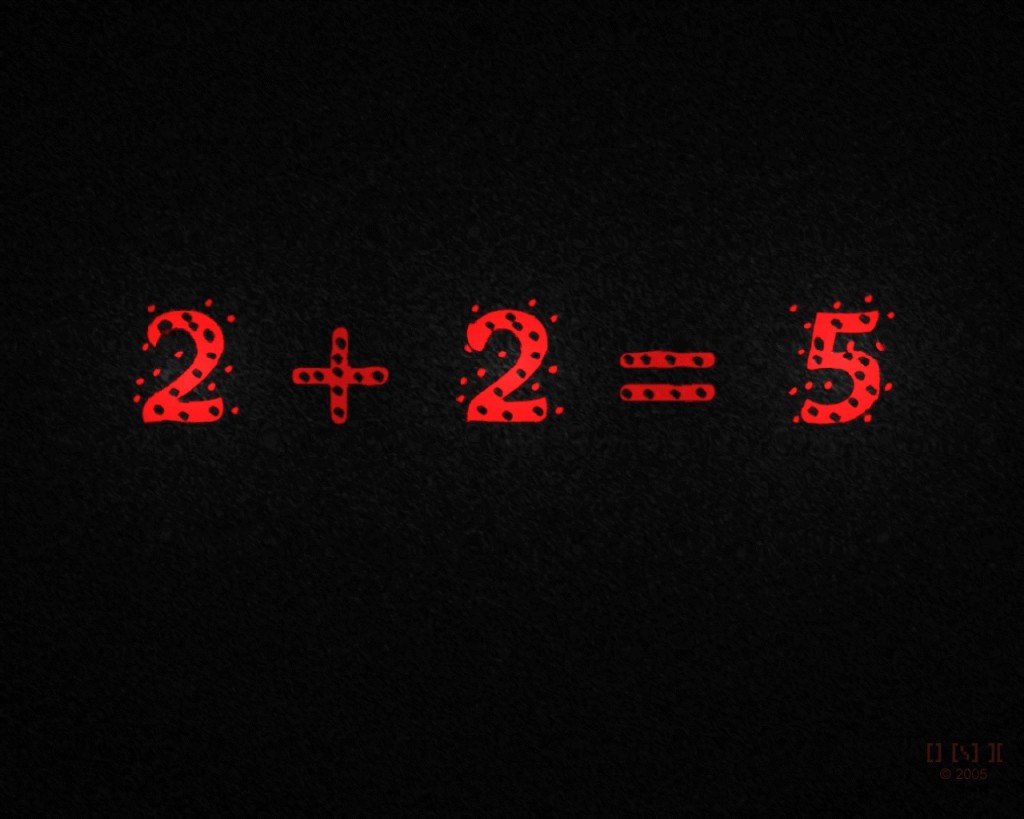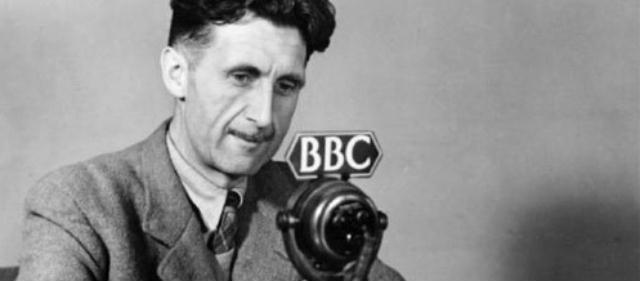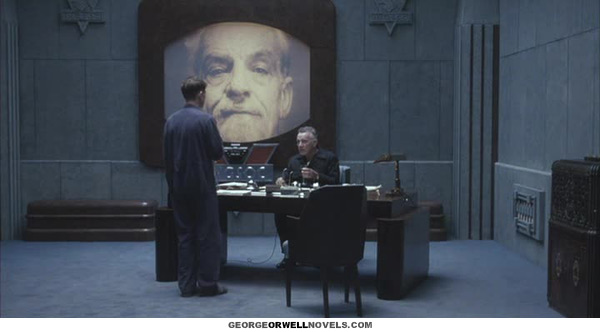Siamo in “1984” di George Orwell, e vediamo cosa succede nei capitoli I e II. Winston e Julia si ribellano agli ordini del Partito, e si amano. Come abbiamo scritto nella I parte di questo articolo sul libro di George Orwell “Ninenteen Eighty Four” (“1984), il “Grande Fratello (GF)”, cioè il capo del partito dell’Ingsoc, vieta le relazioni sentimentali, perché il regno del sentimento è libero per definizione, e quindi incontrollabile. Tu mi chiederai: e la conservazione della specie? Ebbene, Orwell immagina che “GF” voglia diffondere in maniera massiva la “procreazione artificiale”. Se tu con sorpresa rilevi che è quanto sta accadendo oggi nell’Occidente post-tutto, ebbene, hai ragione.
Nel primo brano scelto, i due innamorati si danno appuntamento per un incontro d’amore. Chiosando la bella canzone di Memo Remigi, ecco il titolo del brano:
Sapessi com’é strano… amarsi sotto gli occhi de “Il Grande Fratello”! Ovvero, tutti fuorilegge nel paradiso …delle libertà! pag. 115
‘Can you hear me?’ (Mi senti?)
‘Yes.’ (Sì)
‘Can you get Sunday afternoon off?’ (Ti puoi liberare per Domenica pomeriggio?)
‘Yes.’ (Sì)
‘Then listen carefully. You’ll have to remember this. Go to Paddington Station-‘ (Allora, ascoltami bene, e ricordati: va’ alla Stazione Paddington)
Destabilizzare per stabilizzare. Pag. 153
The rocket bombs which fell daily on London were probably fired by the Government of Oceania itself, ‘just to keep people frightened’. (Nel centro di Londra, ogni tanto cadono bombe, e l’impressione di Winston è che si tratti di auto-attentati, o come si dice in gergo “false flags”, che “GF” fa cadere, per terrorizzare la gente).
La Fratellanza pagg. 175-176
‘You will have heard rumours of the existence of the Brotherhood. No doubt you have formed your own picture of it. You have imagined, probably, a huge underworld of conspirators, meeting secretly in cellars, scribbling messages on walls, recognizing one another by codewords or by special movements of the hand. Nothing of the kind exists. The members of the Brotherhood have no way of recognizing one another, and it is impossible for any one member to be aware of the identity of more than a few others. Goldstein himself, if he fell into the hands of the Thought Police, could not give them a complete list of members, or any information that would lead them to a complete list. No such list exists. The Brotherhood cannot be wiped out because it is not an organization in the ordinary sense. Nothing holds it together except an idea which is indestructible. You will never have anything to sustain you, except the idea. You will get no comradeship and no encouragement. When finally you are caught, you will get no help. We never help our members. At most, when it is absolutely necessary that someone should be silenced, we are occasionally able to smuggle a razor blade into a prisoner’s cell. You will have to get used to living without results and without hope. You will work for a while, you will be caught, you will confess, and then you will die. Those are the only results that you will ever see. There is no possibility that any perceptible change will happen within our own lifetime. We are the dead. Our only true life is in the future. We shall take part in it as handfuls of dust and splinters of bone. But how far away that future may be, there is no knowing. It might be a thousand years. At present nothing is possible except to extend the area of sanity little by little. We cannot act collectively. We can only spread our knowledge outwards from individual to individual, generation after generation. In the face of the Thought Police there is no other way.’ He halted and looked for the third time at his wrist- watch. ‘It is almost time for you to leave, comrade,’ he said to Julia. ‘Wait. The decanter is still half full.’He filled the glasses and raised his own glass by the stem. ‘What shall it be this time?’ he said, still with the same faint suggestion of irony. ‘To the confusion of the Thought Police? To the death of Big Brother? To humanity? To the future?’ ‘To the past,’ said Winston.
(Qui O’Brien, che Winston Smith e Julia credono il capo dell’opposizione, e che invece é un alto esponente del Partito, dunque O’Brien espone ai due malcapitati protagonisti le leggi della clandestinità. Ma come anche gli sviluppi di questa stria dimostreranno, se tutto è clandestino, tutto può essere vero e falso nello stesso momento).
Come finisce questa storia angosciante? Che Winston e Julia sono denunciati da Mr. Charrington, un barista, che affittava ai due amanti un stanza a ore, al primo piano del proprio bar. I due vengono arrestati e portati, separatamente, alla tortura, e quindi alla morte. Il funzionario che interrogherà i due prigionieri sarà quell’O’Brien che essi credevano un esponente della “Fratellanza”! Il mondo del “GF” è un mondo senza verità, nel quale ciò che è, non appare; e ciò che appare, non é. Nel mondo descritto da Orwell, la verità è tutta immanente, cioè creata dagli uomini, attraverso il Partito. Può esistere una verità siffatta? I Cristiani pensano di no, perché seguono ciò che al proposito scrisse San Giovanni Evangelista, nel Prologo del IV Vangelo: Ἐν ἀρχῇ ἦν ὁ λόγος (Greco); In principio erat Verbum (Latino; S. Girolamo); In principio era il Verbo (Italiano). Verbum, o Verbo, o λόγος significa che in Dio c’è la Verità, perché c’è il Verbo, cioè la ragione. Se non credi a ciò, non esiste più un mondo che abbia un senso. Se ne accorse il sommo Goethe, che nel Capitolo 6, di “ Faust” immagina che Faust stia traducendo in tedesco appunto il Prologo di S. Giovanni e, dopo molti dubbi, traduce : Im Anfang war die Kraft! , cioè “In principio era la Forza”.
Per Goethe, questo è il primo passo che porta Faust a consegnarsi a Mefistofele. Ecco qui di seguito i bellissimi versi di Goethe, e il collegamento relativo.
Kapitell 6:
Geschrieben steht: »Im Anfang war das Wort!«
Hier stock ich schon! Wer hilft mir weiter fort?
Ich kann das Wort so hoch unmöglich schätzen,
Ich muß es anders übersetzen,
Wenn ich vom Geiste recht erleuchtet bin.
Geschrieben steht: Im Anfang war der Sinn.
Bedenke wohl die erste Zeile,
Daß deine Feder sich nicht übereile!
Ist es der Sinn, der alles wirkt und schafft?
Es sollte stehn: Im Anfang war die Kraft!
Opere di Goethe, in Tedesco, scaricabili gratis : http://gutenberg.spiegel.de/autor/johann-wolfgang-von-goethe-205
Abbiamo scritto, che O’Brien viene prima ritenuto capo dell’opposizione (“La Fratellanza”), e poi si rivela uno spietato aguzzino del potere. Prima di Orwell, in letteratura, questo argomento è stato trattato da altri Autori.
Ad esempio, Chesterton, immagina che, in un immaginario movimento anarchico nella Londra del XIX secolo, tutti i capi siano agenti doppi dei servizi segreti, ognuno con un nome dei giorni della settimana, nel caso, “L’uomo chiamato Giovedì”.
Gilbert Keith Chesterton : “The man who was Thursday”: vai al link: http://www.gutenberg.org/files/1695/1695-h/1695-h.htm
Vicenda analoga viene narrata da Joseph Conrad, in “The Secret Agent”: http://www.gutenberg.org/files/974/974-h/974-h.htm
Perché é attuale il libro di Orwell? Oltre per i meriti letterari intrinseci, anche perché “Il Grande Fratello” è diventato il titolo di un format televisivo, un “reality” come si dice in gergo, che ha avuto grande successo a livello planetario.
In questo programma, si immagina che dei volontari selezionati dalla produzione, si auto recludano in una casa, che è chiamata “La Casa”, per un periodo di tempo definito, con un meccanismo di eliminazione deciso dai telespettatori, fino alla vittoria, che viene assegnata a chi rimane per ultimo ne “La Casa”.
Durante la permanenza, i concorrenti sono osservati sempre dalla telecamera, proprio come avveniva nella vicenda letteraria. Essi possono avere solo una vita sociale reclusiva, ma non possono leggere, né scrivere, né studiare, né avere rapporti con l’esterno. Chi ha visto, o almeno sentito parlare di, questo programma sa tutto il resto, e i fenomeni mediatici che ha suscitato anche nel nostro Paese.
Cosa c’è di significativo in tutta questa storia? Orwell aveva descritto “Il Grande Fratello” come l’incubo fantapolitico che le ideologie totalitarie del XX secolo, comunismo e nazismo, provocavano nell’uomo comune alla fine della terribile II Guerra Mondiale.
Ebbene, la società post-industriale e post-ideologica del XXI secolo ha esorcizzato questo incubo, perché lo ha introiettato, ovvero sterilizzato. E’ come se qualcuno avesse detto: “ Toglici tutto, e lasciaci il benessere!”.
La mia interpretazione è corretta? Se qualcuno non la condivide, o ne ha altre, sono disponibile a discuterne in questo Blog “ilGrandeInquisitore.it”. Per la I parte dell’articolo, vai al link: : http://www.ilgrandeinquisitore.it/wp-admin/post.php?post=1856&action=edit
